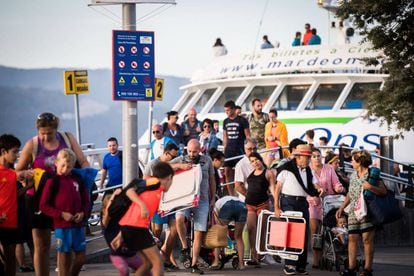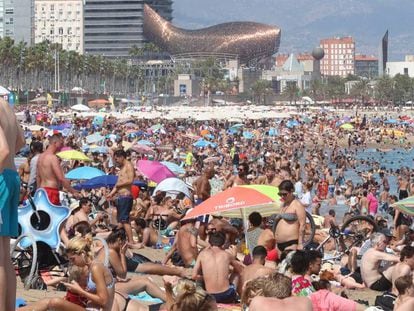Storm brews over Spain’s pristine Cíes Islands as ferries flout visitor limits
Regional government of Galicia to fine companies after protected area off Vigo flooded with visitors
An illegally large number of tourists traveling to Spain’s Cíes Islands – an archipelago in Galicia region without cars and hotels – has put the safety of visitors at risk as well as the survival of unique ecosystem. The ferry operators that take people to the islands off Vigo have sold more than double the quota of 2,200 authorized tickets since the start of the month.

Now hundreds of visitors have found themselves shipped back to Vigo or prevented from getting aboard and visiting the isles that are part of the Atlantic Islands of Galicia National Park.
The police were called in as tempers flared among the 2,000 tourists affected by the crackdown while the regional government of Galicia began taking disciplinary action four of the ferry operators breaking regulations that were introduced back in 1994.
An avalanche of people everywhere, seagulls swooping in crazily for scraps… unbearable! Regular visitor to Cíes Islands
The regional government has said it will take a firm line with the companies involved while the Vigo City Hall is blaming the chaos on the regional government.
One visitor describes her visit to the islands over the first weekend in August as “an avalanche of people everywhere, unimaginably long queues for the toilet attached to the only kiosk on the beach, seagulls swooping in crazily for scraps, empty crisp bags in the crystalline water… unbearable!”
Based in Vigo, she has been going to the islands for years to meet old school friends. But this year was different. “I will never go back in summer. It was horrendous,” she says, adding that there were a number of new ferry operators on the go, many taking foreign tourists. “Our boat had to wait out at sea for several minutes because not all of the ferries could fit in the port.”
As long as it is worth the companies while, nothing will be solved by imposing these fines
Her outrage is reflected in hundreds of comments on social networks from people concerned about the environmental and safety implications of the situation. There is even a petition on Change.org titled Control Mass Tourism on the Cíes Islands and Fine the Ferries. Started by a local of the town of Cangas, the petition demands measures to enforce the law while making it clear that it appreciates that tourism is, “one of the main sources of income in the region.”
Warnings
Ana María Díaz, director general of the Spain’s natural heritage agency, explains that the operators were warned on various occasions about exceeding quotas at the start of August and that disciplinary procedures were initiated at this time. However, this did nothing to deter them from reoffending on August 19.
Adequate deterrents
“As long as it is worth the companies while, nothing will be solved by imposing these fines,” says one local, referring to penalties of between €2000 and €6000 while the initiator of the Change.org petition points out “Given that the average price of a ticket is €19.50, 4,000 extra passengers makes €78,000 for the operators a day.”
In 2015, biologists and ecologists warned that national park was not being managed properly, highlighting the disregard for the cap on tourist numbers as a particular area of concern. Despite being designated a protected area in 2002, it had still not managed to sign off on a management master plan.
Assuming responsibility
Piratas de Nabia, one of the ferry operators brought to book, has publicly acknowledged its wrongdoing, regretting the image this has given the company and the damage its actions have meant for to the national park. Company spokesman, Luisa Leyenda, confirms that exceeding the quotas is nothing new while suggesting that the new fines of up to €200,000 being introduced by the regional government have as much to do with politics as protecting the environment: the socialist-run Vigo City Hall is currently making a bid for the Cíes Islands to be classed as a Unesco World Heritage Site.
Piratas de Nabia is suspending trips to the islands until the storm blows over and is demanding a meeting with the regional government to avoid a repeat scenario. Meanwhile, the National Park’s management is calling for measures that go beyond fines, such as banning offending ferry operators from taking tourists to the islands.
Paradise lost?
The recent disregard for tourist quotas has tainted the image of an archipelago recognized internationally as Europe's slice of paradise. The Guardian regularly refers to Rodas Beach as having some of the most crystalline waters in the world while the travel section of the Daily Telegraph has included the islands among the 28 most secluded maritime gems on the continent. Vigo locals consider them to be the Galician Caribbean, the jewel of the Rías Baixas, and have dubbed them Galifornia.
The mayor of Vigo, Abel Caballero, has blamed the regional government for the chaos of recent days, which, he claims, has caused irreparable damage to the image of the islands. According to Caballero, the regional government is in charge of the management of the national park and controls the ferry operators’ activities. Though he doesn’t excuse the behavior of the operators, he flags up the risks involved in the regional government's decision to stop hundreds of indignant passengers from sailing to their destination. It is also a coincidence, he says, that the worst chaos concerning tourism in living memory coincides with the City Hall’s bid to have the Cíes Islands declared a World Heritage Site.
English version by Heather Galloway.












































